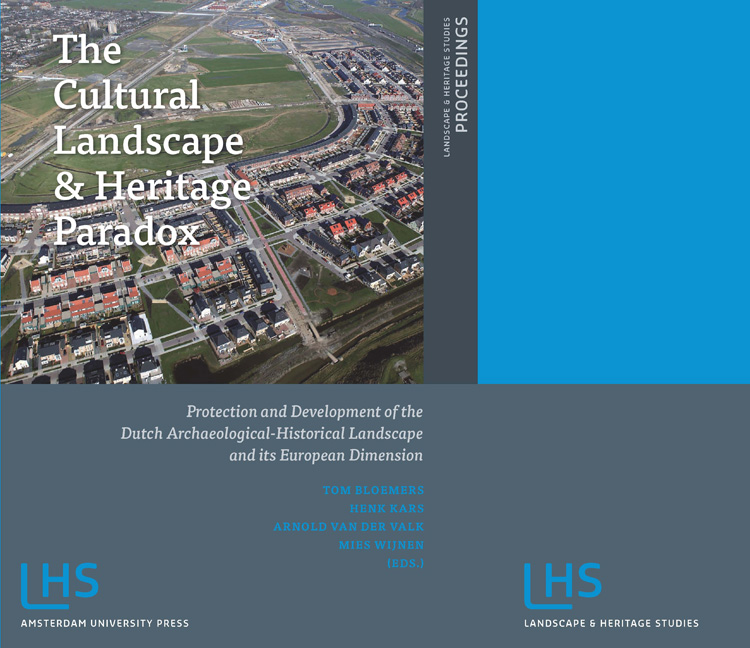 The Cultural Landscape and Heritage Paradox
The Cultural Landscape and Heritage Paradox Book contents
- Frontmatter
- Contents
- Preface
- I INTRODUCTION
- II INSIGHTS AND PROSPECTS OF ARCHAEOLOGICAL-HISTORICAL LANDSCAPE STUDIES
- III LINKING KNOWLEDGE AND ACTION
- IV IMAGINATION - FACTS AND CONSTRUCTIONS
- V SHARING KNOWLEDGE - STORIES, MAPS AND DESIGN
- VI SYNTHESIS AND CONCLUSIONS
- VII MANAGEMENT OF KNOWLEDGE
- VIII AGENDA FOR THE FUTURE
- IX SUMMARY
- X APPENDIX
- Subject Index
- Index of Places and Regions
1 - Introduction: Sharing Knowledge - Stories, Maps and Design
Published online by Cambridge University Press: 21 January 2021
- Frontmatter
- Contents
- Preface
- I INTRODUCTION
- II INSIGHTS AND PROSPECTS OF ARCHAEOLOGICAL-HISTORICAL LANDSCAPE STUDIES
- III LINKING KNOWLEDGE AND ACTION
- IV IMAGINATION - FACTS AND CONSTRUCTIONS
- V SHARING KNOWLEDGE - STORIES, MAPS AND DESIGN
- VI SYNTHESIS AND CONCLUSIONS
- VII MANAGEMENT OF KNOWLEDGE
- VIII AGENDA FOR THE FUTURE
- IX SUMMARY
- X APPENDIX
- Subject Index
- Index of Places and Regions
Summary
ABSTRACT
This section focuses on questions related to the role of maps, images and metaphors in the process of knowledge creation for cultural landscapes and heritage. Images and metaphors play a pivotal role in the creation of planning support systems and the dissemination of information and interpretation of geographically tagged data. The author emphasises the value-laden character of images and the need to specify underlying frames of reference. Raw data do not speak for themselves no matter how seductively they may be packed. Processing of data and information into knowledge is dependent upon anticipated uses in the domains of science and policymaking. In science, truthfulness is the leading principle. In policy, other values such as legitimacy, applicability and transparency are equally relevant. Framing of knowledge is an emerging theme in scientific research in the aftermath of the European Landscape Convention and its recognition of the importance of the human dimension in landscape valorisation and evaluation.
KEY WORDS
Landscape, preservation, development; images, metaphors, spatial concepts; knowledge-action nexus; European Landscape Convention
RATIONALE OF SHARING KNOWLEDGE
Data and knowledge
Raw data do not speak for themselves. Data have to be interpreted in order to make sense or transformed into meaningful information or knowledge (Popper 1966, 260). Interpretation starts from a theoretical frame of preconceived notions. That is where disciplines, discourses and power conflicts enter scientific narratives which help us make sense of the world we live in (Gibbons et al. 1994; Gieryn 1999). After the science wars in the 1990s a growing number of scientists aired their doubts about the rigidity of the old positivistic divide in facts and values (Funtowicz/Ravetz 1990; Flyvbjerg 2001; Ravetz 2007). The papers in this section are all linked in some way by questions pertaining to the processing of knowledge and the transfer of knowledge to the domain of heritage management and spatial planning. The translation of scientific knowledge into policy considerations by way of evaluation, policy design and monitoring opens an amalgam of epistemological and ontological questions (Friedmann 1987; Argyris/Schön 1996; Hisschemöller/Hoppe 1995). Policy is defined here as taking preparatory actions to create a framework for operational decisions. Operational decisions preclude interventions by governmental bodies which may be taken in co-operation with non-governmental organizations.
- Type
- Chapter
- Information
- The Cultural Landscape and Heritage ParadoxProtection and Development of the Dutch Archaeological-Historical Landscape and its European Dimension, pp. 365 - 386Publisher: Amsterdam University PressPrint publication year: 2010


